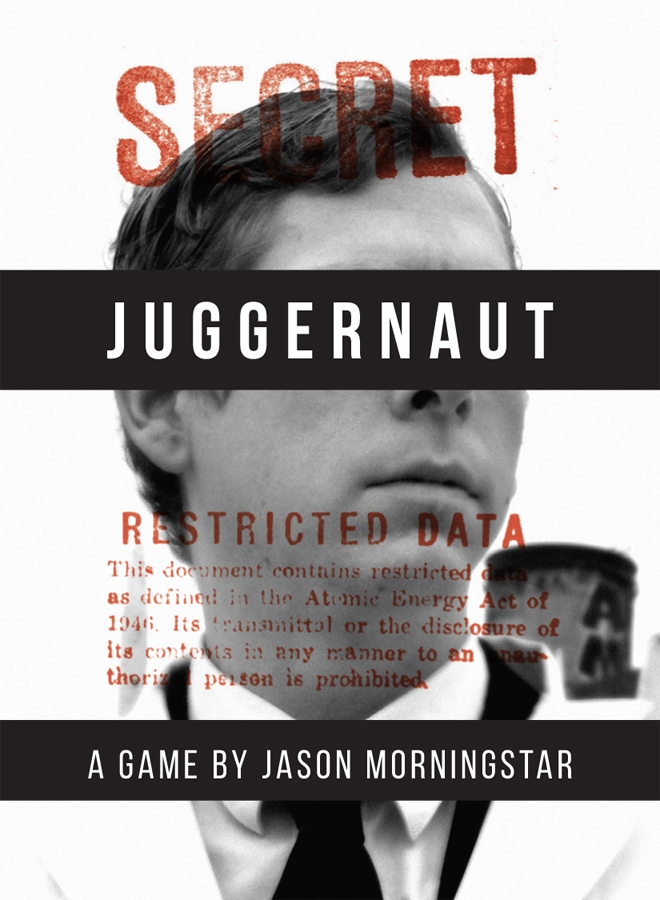 Players: Adrienne Mueller, Eric Fattig, Karen Twelves, and Sean Nittner
Players: Adrienne Mueller, Eric Fattig, Karen Twelves, and Sean Nittner
System: Juggernaut
Oh wow. this game. this game. Here’s the premise:
JUGGERNAUT is card-based live-action roleplaying game about free will for 4-6 players from the creators of FIASCO and CAROLINA DEATH CRAWL.
It is July third, 1950. The Korean War is eight days old. National Security Council Report 68 is sitting on Harry Truman’s desk, a grim outline of the Cold War that is to enfold the world for the next 40 years. Alan Turing’s paper “Computing Machinery and Intelligence” is circulating for review. Cinderella is a box office sensation. And you have invented a computer that can see the future.
Employing cutting-edge Ward-Takahashi identity derivations outside their quantum-theoretical framework, JUGGERNAUT processes enormous data sets, ostensibly in the service of code-breaking once the technology is proven and refined. The unstable geniuses behind the math have reached some curious conclusions that only experimental evidence can confirm. By the numbers, JUGGERNAUT – given enough resources – should be able to crack ciphers before they are even invented.
Our cast
Dr. Takahashi (Adrienne) – In the beginning an eager, if defensive scientist. In the end, the only humanitarian among us, hateful of Brasseau, and prepared for a terrible end.
Dr. Dörflinger (Karen) – A brilliant doctor, obsessed with the legacy he would leave behind.
Major Van Der Meer (Eric) – A decorated veteran looking for solutions to military problems. Ready to destroy the machine by the end.
Brasseau (Sean) – The voice of the people, looking for results, and obsessed with free will.
The Play is the Thing
Play was fantastic, and horrific, and surprising. From the first summary output we were on edge. By the third I was loosing my mind. By the middle we had turned against each other, then back, then against each other again. At the end, I was wrecked and wanted to give everyone a hug. Very much out of character!
What rocked
Oh man, this game is so good. And our group is so good. From the moment the game started everything was important, everything was meaningful. Our characters were dynamic and real, with motivations that were both complex and easy to understand.
The system outputs were powerful, random, and terrible. The creative constraints they put on us were awesome. As characters we constantly railed against them. As players we fastidiously ensured they were all true. Some of the reveals (when an prediction would be actualized) were god damn creepy, even though as a player I knew were all just making sure they happened. Brains are weird that way!
What could have improved
I don’t think it’s coincidence that these situation first, rules almost never, games are producing some amazing single session experiences. Fall of Magic and this game were both fantastic. I could say the same for Witch, Inheritance, and Blood in the Bayou. These games have been great and delivered an amazing experience. They don’t lend themselves to multiple sessions or replay necessarily. And I think that is part of what makes them so good, because there is nothing to gain from them except the play itself. No experience points to gain, no treasure to loot.
The conundrum being that of course, I want to play campaign games where we see the characters grow. Yes getting all the sweet, sweet XPs, but also developing the characters, watching their relationships grow and change, seeing how the world affects us, and how we’re affected by it. Finding that sweet spot in the middle is tough. Our Blades game is there, but then that’s one that is nigh impossible to schedule. I want my cake and to eat it too!

I also really enjoyed this game – particularly because of the contributions of the other players. Eric and Sean both allowed their (complex!) characters to act a little villainous sometimes, and Karen played a German who wasn’t evil and had a cool motivation.
Only quibble I would make is that it’s very hard to maintain consistency. I felt I was vacillating heavily in my portrayal of Takahashi. Partly it can take a while to decide on your motivations for a character, but mainly: every time you draw a card you need to accommodate new information. Some degree of erraticness is forgivable given 1) people are human (often inconsistent) and 2) the extreme drama of the circumstances. But I think it is definitely a challenge to make realistic characters whose behaviors still conform to the constraints of the system.
Again – had a fantastic time. So much tension!